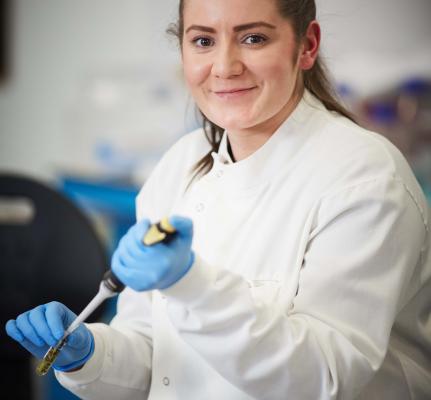Healthcare science assistants and associates
Healthcare science assistants and associates make a difference to patients' lives by supporting assessment and diagnosis of disease and illness. Some will work in laboratories but others will work directly with patients every day.
Working life
As a healthcare science assistant or healthcare science associate, you'll support colleagues across a range of healthcare science areas in the NHS. For example, you might work in:
- a pathology laboratory, processing samples of blood, cells or tissues
- a cardiology department, taking readings of a patient's heart
- a respiratory department, measuring a patient's breathing
- an audiology department, helping to identify and assess hearing and balance dysfunction
In any department, you could be:
- inputting data
- working directly with patients
- following laid down procedures
- ordering stock
In some roles, you may have a specific title, for example:
- phlebotomist (taking blood)
- cardiographer (monitoring the heart)
- newborn hearing screener (assessing hearing in newborn babies)
Some healthcare science support roles have the older title of assistant technical officer.
Leanne Evans
Laboratory support technician
Read Leanne's storyThere are many opportunities for hands-on experience that I wouldn’t get in other roles.

Entry requirements
There are no set entry requirements to become a healthcare science assistant. Employers usually expect good literacy, numeracy and IT skills. They may ask for GCSEs, or equivalent level 2 vocational qualification.
You may be able to enter a healthcare science assistant role through an apprenticeship at level 2.
For healthcare science associate positions, you're likely to need A levels (including at least one science) or relevant level 3 vocational qualifications in healthcare science and some relevant experience of working in healthcare science. Level 4 apprenticeships for healthcare science associates have been approved.
Even where this is not specified, it would be an advantage if you have worked in health or social care, either in paid employment or voluntary work. Find out more about gaining experience.
It is important to always check the content of the person specification for any vacancy you're applying for, as requirements may vary.
Skills and personal characteristics
As a healthcare science assistant or associate, you'll need to be:
- able to follow instructions and procedures
- flexible and adaptable
- careful and methodical
- able to work alone or as part of a team
- physically fit for standing, lifting, etc
You'll also need:
- scientific or technical skills
- organisational skills
- communication skills
Pay and benefits
As a healthcare science assistant you will typically start on AfC band 2 or 3. As a healthcare science associate, you will usually work at AfC band 4. Healthcare science assistants and associates work standard hours of around 37.5 a week. Some may work shifts, which could involve nights, early starts, evenings and weekends.
Training
You will get the training you need to do the job. This will include health and safety and an introduction to the department and its ways of working. Some of your training will be specific to your job role.
You may be offered the chance to take qualifications such as the Pearson BTEC Level 2 Certificate in Introduction to Healthcare Science, if you're working as a healthcare science assistant.
If you're working as a healthcare science associate, then you may be offered the chance to take qualifications such as the Pearson BTEC Level 4 Certificate in Healthcare Science.
Apprenticeships in healthcare science at level 2 (for healthcare science assistants) and level 4 (for healthcare science associates) are being developed by the National School of Health Care Science (NSHCS).
Find out more about healthcare science apprenticeships on the NSHCS website
Where the role could lead
If you start as a healthcare science assistant, with experience and further training, you could apply for positions as a healthcare science associate. With further experience as a healthcare science associate (and provided you have the academic ability), you could apply for the NHS Practitoner Training Programme by taking an undergraduate BSc (Hons) healthcare science.




